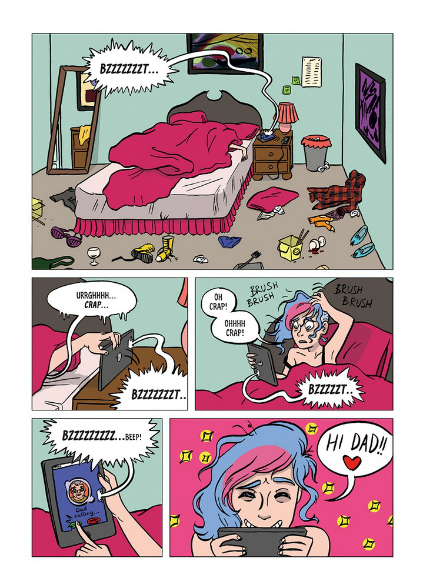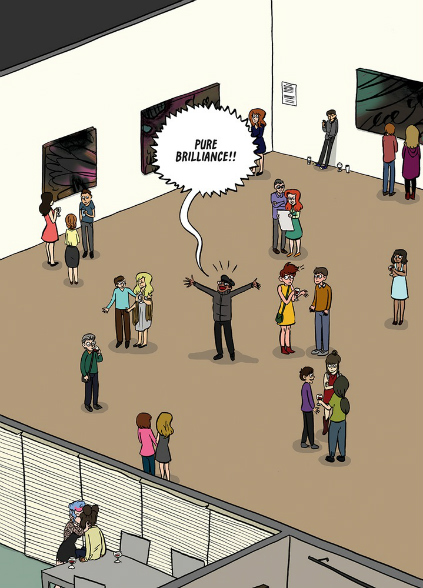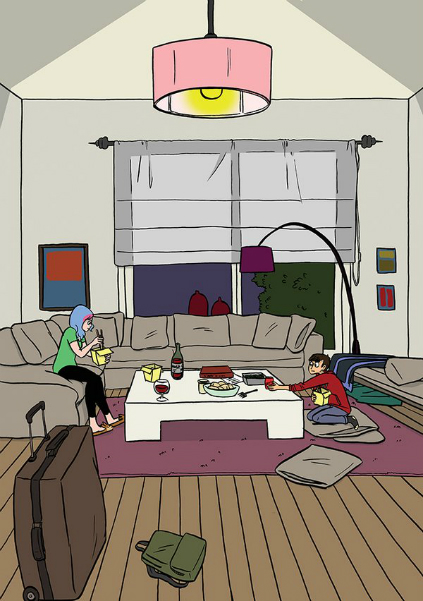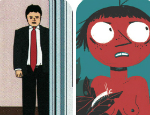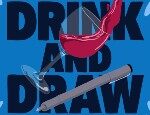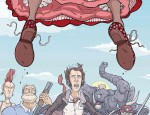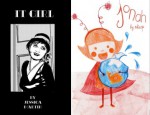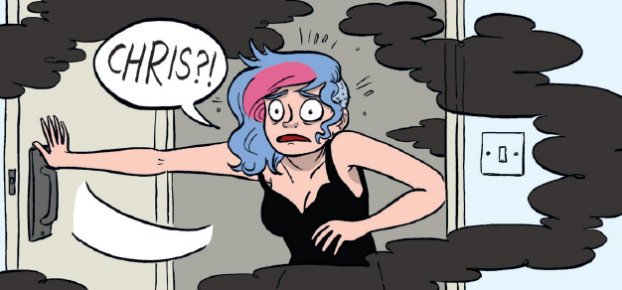
As Rachael Smith’s graphic novel and comics portfolio begins to build up into a significant body of work, a sense of growing narrative cohesion has also become apparent. One of those interconnections is thematic and I intend to touch on it before the end of this review. But there’s another layer of linkage between her stories emerging that is a little more traditional in terms of the standards of the form. Artificial Flowers – her latest offering from Avery Hill Publishing – pulls a number of the tales of the twice British Comic Awards-nominated artist together with a formal acknowledgement that some of those books, at least, are part of a wider “Smithverse”.
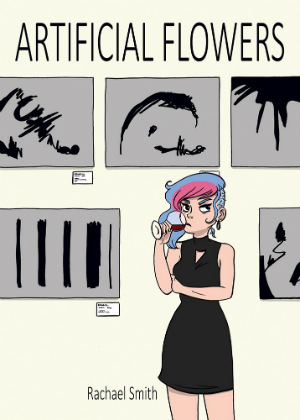 Artificial Flowers takes characters from Smith’s I Am Fire and House Party and spins them off into their own story with intriguing overlaps with those previous works. Fret not if you’re new to Rachael Smith’s work, however, because this book is as good a starting point as any other in her back catalogue. Smith is simply far too canny a writer to lose casual readers with a mass of unnecessary expository backstory. While the book acknowledges a shared fictional reality, no prior knowledge of Smith’s comics is needed to enjoy it. It works as a discrete entity in itself and can be experienced as a fully accessible, self-contained story.
Artificial Flowers takes characters from Smith’s I Am Fire and House Party and spins them off into their own story with intriguing overlaps with those previous works. Fret not if you’re new to Rachael Smith’s work, however, because this book is as good a starting point as any other in her back catalogue. Smith is simply far too canny a writer to lose casual readers with a mass of unnecessary expository backstory. While the book acknowledges a shared fictional reality, no prior knowledge of Smith’s comics is needed to enjoy it. It works as a discrete entity in itself and can be experienced as a fully accessible, self-contained story.
This is Smith’s third graphic novel and it follows the stalling career of Siobhan, a young woman failing to make a name for herself on the London art scene while living off an allowance provided by her mother and father. When her younger brother Chris – a troubled youth with a penchant for pyromania – is foisted on her by her exasperated parents Siobhan is forced to deal not just with her own sense of failure but also with a teen mesmerisingly attracted to the aesthetic delights of the naked flame.
As their uneasy relationship continues to deteriorate, one revelatory moment of conflict will change their lives forever and a dubious creative partnership will be forged. But are the galleries and arty movers and shakers of London really ready for what is about to be unleashed upon them by these duplicitous siblings?
There’s one level on which Artificial Flowers operates that is amusing but hardly original in conception; that oft explored idea of puncturing the pretensions of the art world while a nodding audience looks on in gleeful approbation. Here that is achieved via the medium of candid teenage belligerence. But parodying the conceited affectations of aesthetic snobbery is merely the hook that Smith’s more subtle character interplay is hung on. Because, as any regular reader of her comics knows by now, a Rachael Smith production is first and foremost always grounded in a deep and rich sense of characterisation.
As events escalate and Siobhan and Chris’s actions raise questions about intellectual property, creative ownership and the definition of art (often with a knowing smirk in the reader’s direction) the book’s true purpose of examining the importance of self-expression and being faithful to our own vision slowly creeps to the forefront. This is delicately understated in terms of pacing and plot progression and all the more effective for it. By story’s end there are moments of epiphany – and a sobering message about the artistic process and creating for creation’s sake – as damaged souls begin to heal and the reader realises, yet again, how utterly invested they have become in Smith’s cast.
Artificial Flowers marks a thematic through-line in Smith’s work that began in House Party and The Rabbit. Through all three of her longer-form works she has invited her readership to travel alongside her characters on journeys of self-discovery. In House Party that was about the realisation that we need to look forwards, not live in the past and accept life’s ever evolving nature. In The Rabbit it centred on characters coming to terms with confronting their fears and not running away from them.
Here in Artificial Flowers we observe Siobhan and Chris’s personal growth and development as they learn important lessons about the value of self-expression and personal integrity. These motifs of self-reflection and revelation have become a welcome cornerstone of her comics and ensured the bond we have with her protagonists is a profoundly sympathetic one.
As ever, Smith’s visual characterisation plays a vital part in bringing this central duo to life. For much of the book Siobhan and Chris are, to all intents and purposes, trapped in that archetypal slacker existence but without the requisite self-awareness to realise it. It goes without saying that one telling look from either character provides more information about their thoughts or state of mind than pages of narration or contrived dialogue ever would. Smith’s panel-to-panel comedy timing is also as exquisite as we have come to expect from her (perfecting the sub-genre of pyromaniac slapstick this time around).
Witty, touching, charming, poignant and life-affirming. It may sound twee to describe Artificial Flowers as all these things and, essentially, they’re the same adjectives I use every single time I review a Smith book. Repetition, however, does not negate their validity. Few creators can make you care about their characters, share in their joys and celebrate their triumphs like Rachael Smith does. And that is a very special gift indeed.
For more on the work of Rachael Smith visit her website here and follow her on Twitter here. You can buy Artificial Flowers from the Avery Hill Publishing online store here priced £9.99.
For regular updates on all things small press follow Andy Oliver on Twitter here.





